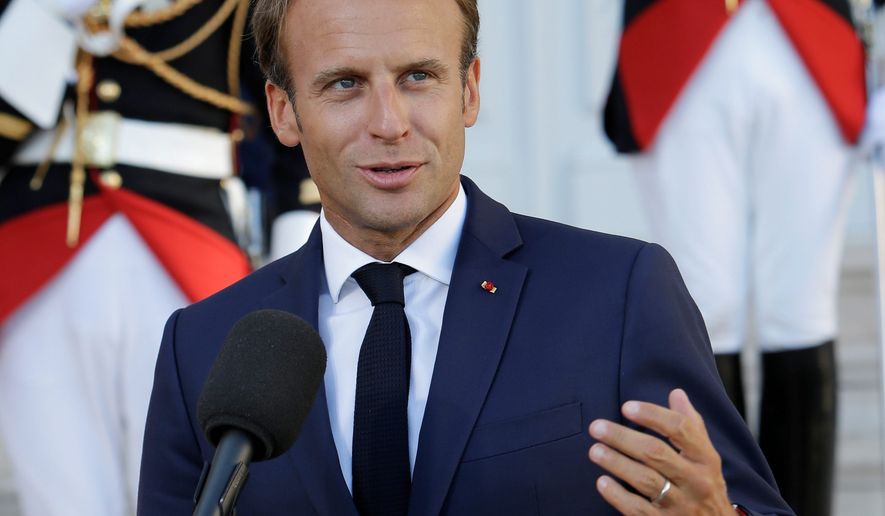PARIS — French President Emmanuel Macron recently acknowledged to a class of sixth-grade students in Laval in western France that he was having a tough time in his job.
“Some days are easy,” he said. “Others are not.”
For the novice politician who seemed poised to obliterate the mold of French politics after his overwhelming electoral victory in the spring of 2017, the difficult days have particularly piled up in the past few weeks while the easy days have all but disappeared.
Slumping approval ratings, unplanned Cabinet reshuffles, growing skepticism of his reform agenda and his “Jupiterian” approach to government, a term Mr. Macron adopted during his campaign to describe his goal of reshaping French society, have taken the shine off the 40-year-old president.
The French are divided on whether Mr. Macron will achieve his far-reaching plans, which include loosening the country’s notoriously restrictive labor laws, boosting innovation and reducing the role of the state in the economy. But they agree that the president will have to reconnect with ordinary voters if he hopes to win a second term in the Palais de L’Elysee in 2022.
Critics say Mr. Macron has adopted the patrician, remote governing style of his predecessors, both left and right.
“He’s young, ambitious and keen on shaking things up in this country,” said retired postal worker Annick De Oliveira, 61. “But I don’t see him as someone who is close to the people. He’s anything but humble.”
Mr. Macron made an off-the-cuff remark about “Gauls who are resistant to change” during a visit to Denmark last month. The comment landed him in hot water at home because it was widely interpreted as an insult to French identity.
A few days later, Mr. Macron’s approval rating plunged to 31 percent, according to French polling firm Ifop, making him more unpopular than his one-term predecessor, socialist Francois Hollande, at the same point in office.
Those ratings also reflected dismay over a scandal involving one of the president’s closest security aides, who was videotaped assaulting demonstrators during a May Day rally in Paris.
The embarrassment diverted attention from a wave of economic reforms Mr. Macron rolled out after France’s traditional summer break in August.
Mr. Macron also had to deal with an unexpected Cabinet reshuffle in late August after the dramatic exit of Environment Minister Nicolas Hulot, who resigned during a live radio interview without informing the president first.
Mr. Hulot, a popular politician and green activist, said he was frustrated by the “small steps” the government was taking to deal with climate change. “This subject is always relegated to the bottom of the list of priorities,” he said in the interview.
The departure of Mr. Hulot was widely regarded as a major blow to Mr. Macron, who has tried to portray himself as a moderate who wants to reform France’s economy while addressing climate change.
A week later, Sports Minister Laura Flessel said she was resigning from the government for “personal reasons.” Mr. Macron replaced her with former backstroke swimming champion Roxana Maracineanu.
Falling behind
At first, polls showed broad support for Mr. Macron’s pro-business reform plan. Respondents expected the plan to boost growth and jobs after France lagged behind many other European economies and the U.S. on growth and employment during the Hollande years.
Polls show voters largely sided with Mr. Macron when he announced subsidy cuts and reforms to indebted railway operator SNCF, though the plan sparked months of strikes. The cuts and reforms were finally approved in June.
Economic growth in recent months has been more sluggish than Mr. Macron had hoped, particularly for lower-income families, sparking criticism that Mr. Macron’s policies were skewed to favor big business and the wealthy.
An Odoxa-Dentsu Consulting poll in Le Figaro newspaper showed that three-quarters of French people perceived the former investment banker as “the president of the rich” just a year into office.
Mr. Macron’s main problem is that his reforms have not delivered tangible improvements in the everyday lives of French people and has threatened the health of the country’s treasured social safety net. Many voters fear that Mr. Macron’s moves will hit their pensions, their jobs and their purchasing power.
“The French are critical because the reforms keep accumulating without a corresponding improvement in the quality of life,” said Philippe Waechter, director of economic research at Ostrum Asset Management in Paris. “They don’t understand how reforms will change their life for the better.”
Just as worrisome, many French business groups are bridling at the government’s reforms.
A planned reform of the revenue tax next year, which will mandate pay-as-you-earn monthly deductions for employees, was intended to simplify tax collection. The plan has reportedly run into technical troubles amid concerns that many French companies are not ready to implement it. Stories of employees paying workers’ taxes twice or paying for the wrong people have also surfaced.
If Gauls don’t like change, they will have plenty of reasons to dislike the new tax system even if it works, potentially sending Mr. Macron’s popularity ratings even lower.
“Will the reform create the conditions to improve everyone’s situation after the initial psychological shock the French will experience at the sight of their pay slip in January?” Mr. Waechter asked. “Will everyone see an improvement in their life quality, or will they find a reason to be critical?”




Please read our comment policy before commenting.